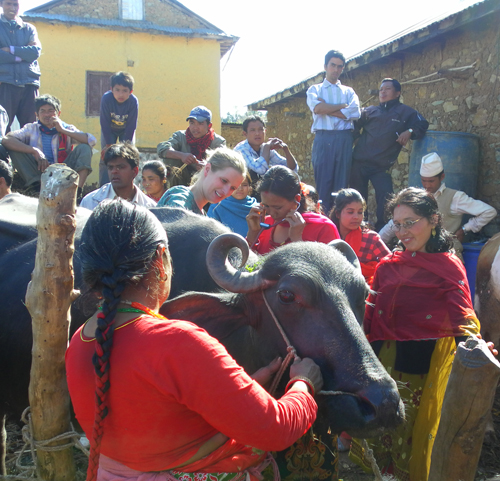
After returning from Nepal where she met “the most amazing people,” veterinary grad Claire Windeyer is discovering that some think she’s amazing, too.
Windeyer is this year’s recipient of the Forster Medal, the University of Guelph’s top award for graduate students. The award was presented at spring convocation ceremonies in June. Named after former U of G president Donald Forster, the award recognizes academic achievement, motivation, leadership and citizenship.
“I don’t know what I did to deserve it, but it’s a very special feeling to receive that kind of recognition,” said Windeyer.
What she did was become an award-winning, published researcher who helped run numerous committees and initiatives while completing her D.V.Sc. in ruminant health management with Prof. Stephen LeBlanc in the Department of Population Medicine.
“She is a great credit to the University and a worthy recipient of this honour,” said LeBlanc. “Claire is a very intelligent, curious, productive person, and she was a pleasure to work with as a student and team member in our clinical service.”
Windeyer helped run the department’s green initiative that was launched by fellow graduate student Lee Wisener. She also took on leadership roles working with other researchers and grad students, and in helping teach senior veterinary students. Last year, her research and presentation skills earned top prizes at conferences of the American Dairy Science Association and American Association of Bovine Practitioners. Her D.V.Sc. research made a substantial contribution toward understanding the epidemiology of respiratory disease, the most common infectious disease of weaned cattle, and the role of vaccination in its control, LeBlanc said.
In late 2010, Windeyer’s curiosity and passion for the environment took her to Nepal, where she worked with milk producers to improve animal health knowledge and management skills. She was there with the Centre for International Studies and Cooperation and Veterinarians Without Borders/Vétérinaires sans Frontières – Canada in partnership with the Lalitpur District Milk Producer Co-operative Union.
On average, Nepali farmers get just $5 a day for their milk, which mostly comes from buffalo. Dairy farming is one of the few means by which income is brought from urban centres to the rural poor. Windeyer helped deliver training sessions to co-op members, covering subjects such as infectious disease, diseases of the uterus, milk quality and hygiene.
“I left with a million ideas for future projects,” said Windeyer, who recently accepted a position as an assistant professor at the University of Calgary faculty of veterinary medicine. But she hopes to find her way back to Nepal one day.
“I think the most rewarding part of it was how enthusiastic the farmers were to learn and improve, and how generous and welcoming the people were. They were some of the most amazing people I’ve met in my life.”